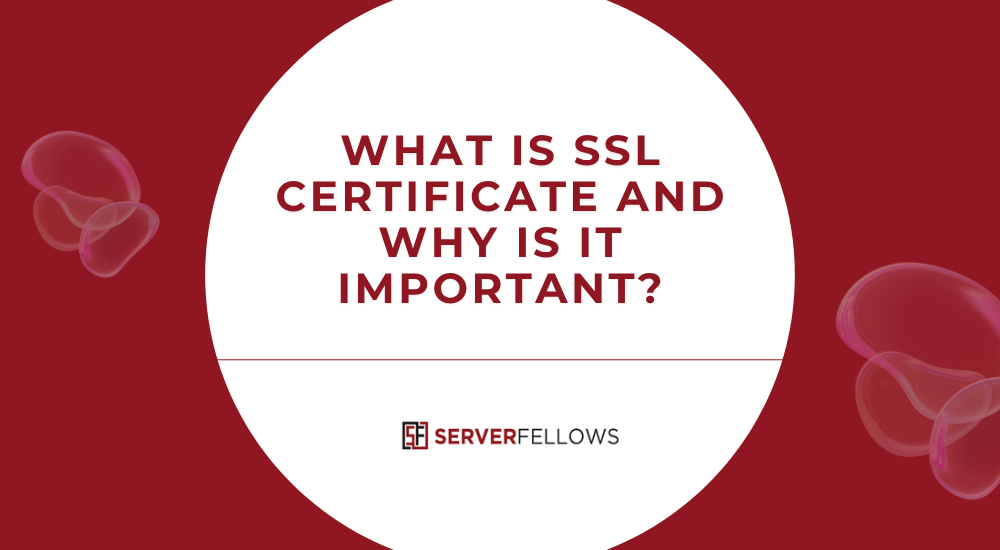
What Is SSL and Why Every Website Needs It
You’ve seen the little padlock icon in your browser. That’s SSL at work. But why is it so important for your website?
Secure your site with SSL at Serverfellows.com — included in all hosting plans.
What Is SSL?
SSL (Secure Sockets Layer) is a technology that encrypts the data sent between your website and your visitors. Think of it as a secure tunnel: any information — whether it’s login details, payment information, or even a simple contact form — is scrambled so that no outsider can intercept or misuse it.
When a site has SSL, the web address changes from http:// to https://, and a padlock icon appears in the browser bar. That simple change is a visual cue to your visitors that your site is safe to use.
Why Every Website Needs SSL
No matter what type of website you run — a blog, an online store, or even a personal portfolio — SSL is non-negotiable. Here’s why:
- Trust: Customers see the padlock and immediately feel safer engaging with your site.
- Security: Sensitive data like logins, payment card numbers, and personal details stay private.
- SEO: Google and other search engines rank SSL-enabled sites higher in search results.
- Compliance: Many industries, especially e-commerce, legally require SSL for protecting consumer data.
- Conversions: Without SSL, visitors are likely to bounce when they see “Not Secure” warnings.
With Serverfellows.com, SSL certificates come free with hosting — no extra cost, no hassle.
How SSL Works (Explained Simply)
At a technical level, SSL uses encryption algorithms to ensure that data passed between a browser and server cannot be read by anyone in the middle. Here’s the simplified process:
- Handshake – When a visitor lands on your site, the browser and your server establish a secure connection.
- Encryption – The data being transmitted is scrambled using cryptographic keys.
- Decryption – Only your server can decode the data with its private key.
- Verification – The SSL certificate proves your site’s identity, building trust with the visitor.
In other words, SSL makes your site’s communication private and authenticated.
Types of SSL Certificates
Not all SSL certificates are the same. Different websites have different needs, and the type of SSL you choose depends on your business model:
1. Domain Validated (DV) SSL
- The most basic type.
- Verifies domain ownership.
- Ideal for blogs, personal websites, or small projects.
2. Organization Validated (OV) SSL
- Requires additional business verification.
- Displays company information in the certificate.
- Suitable for professional sites and businesses.
3. Extended Validation (EV) SSL
- The highest level of validation.
- Shows the organization name directly in the browser bar (in some browsers).
- Best for e-commerce platforms, financial services, or enterprises handling sensitive data.
With Serverfellows.com, you don’t need to worry about the complexity — all hosting plans include DV SSL certificates at no extra cost, which is perfect for most websites.
The Risks of Running a Website Without SSL
Still not convinced? Here are the real-world consequences of not using SSL:
- Browser Warnings: Visitors see “Not Secure” alerts, discouraging them from staying.
- Data Theft: Hackers can intercept and misuse sensitive data.
- Lost Rankings: Google penalizes non-SSL websites by ranking them lower.
- Customer Distrust: Users are less likely to sign up, shop, or interact.
- Legal Trouble: For e-commerce or data collection, operating without SSL could mean non-compliance with regulations like GDPR or PCI-DSS.
Simply put: without SSL, you risk losing traffic, customers, and revenue.
SSL and SEO: Why Google Prefers Secure Sites
Google has openly stated that SSL is a ranking signal. That means if two sites are equal in every way except one has SSL, the secure site will rank higher.
Reasons why SSL improves SEO:
- Increased User Trust: Lower bounce rates as visitors feel safer.
- Better Crawling: Googlebot prefers secure websites for indexing.
- Future-Proofing: With search algorithms constantly evolving, SSL keeps you compliant.
If organic traffic is important to you (and it should be), enabling SSL is one of the simplest SEO wins.
Common Myths About SSL
Despite SSL being around for decades, many myths still exist. Let’s debunk them:
Myth 1: SSL Is Only for E-commerce
Wrong. Even if your site is a personal blog, you still collect information — like email addresses, comments, or contact form submissions. All data deserves protection.
Myth 2: SSL Slows Down Websites
Outdated SSL might have slowed sites decades ago, but modern SSL is optimized for speed. In fact, SSL can improve performance with HTTP/2 protocols.
Myth 3: SSL Is Expensive
Many hosting providers used to charge extra for SSL, but not anymore. With Serverfellows.com, SSL is included free in every hosting plan.
Myth 4: Free SSL Isn’t Safe
Free SSL (like Let’s Encrypt) provides the same level of encryption as paid SSL. The difference is usually in support and warranty, not security.
Real-World Examples of SSL in Action
- E-commerce Stores: Without SSL, checkout pages scare customers away with “Not Secure” warnings. With SSL, trust skyrockets and conversions improve.
- Membership Sites: If you run a course, a paid community, or even a forum, SSL protects login data.
- Blogs & Portfolios: Even if you don’t sell, SSL improves SEO and prevents hijacking of forms.
- Healthcare or Financial Sites: Regulations require SSL for protecting sensitive data.
SSL isn’t optional — it’s the foundation of credibility.
FAQs on SSL
Do I need SSL for a simple blog?
Yes. Even blogs often collect user data, like email subscriptions or contact forms. SSL ensures your readers feel safe.
Is SSL expensive?
No. Many hosts, like Serverfellows.com, provide SSL certificates for free with hosting.
Will SSL slow my site?
Not at all. Modern SSL protocols are designed to be lightweight and fast.
Is SSL mandatory?
Yes, especially for businesses handling payments or user data. Even browsers now make it effectively mandatory by flagging non-SSL sites.
How do I install SSL?
With Serverfellows.com, SSL is automatically installed with your hosting plan. No manual setup required.
SSL and Future-Proofing Your Website
The internet is constantly evolving. Cybersecurity threats increase daily, and user expectations rise. Tomorrow’s websites will rely even more on security, trust, and compliance.
Here’s how SSL helps future-proof your website:
- Browser Evolution: Future browsers may completely block non-SSL sites.
- Customer Habits: Users are becoming savvier; security icons influence trust.
- Data Protection Laws: Regulations around the world are getting stricter. SSL ensures compliance.
If you want your website to stay relevant, SSL is a baseline requirement.
Steps to Secure Your Site With SSL
Getting SSL doesn’t need to be complicated. Here’s the step-by-step process:
- Choose a Hosting Plan With SSL Included – This saves cost and hassle.
- Install the Certificate – With providers like Serverfellows.com, this is automatic.
- Redirect HTTP to HTTPS – Ensure all your traffic uses the secure version.
- Update Internal Links – Change old
http://links tohttps://. - Test Your Site – Use tools like SSL Labs to confirm your SSL is active and valid.
With the right hosting partner, these steps are seamless.
Why Choose Serverfellows.com for SSL Hosting
While many providers charge extra for SSL, Serverfellows.com includes it in all hosting packages. Here’s what you get:
- Free SSL Certificates — no hidden costs.
- Automatic Installation — no technical setup needed.
- Secure Infrastructure — hosting built with security-first architecture.
- 24/7 Support — experts ready to help anytime.
That means you can focus on your business, while your website security is taken care of.
Conclusion and Call to Action
SSL is no longer optional — it’s essential. From protecting data to boosting SEO rankings and ensuring compliance, SSL is the foundation of a trustworthy and successful website.
Whether you run a blog, an e-commerce store, or a business site, SSL protects your visitors and your reputation.
👉 Get SSL hosting today with Serverfellows.com — secure hosting built for growth.


